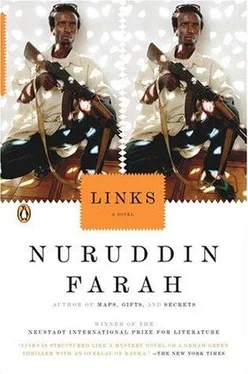Bile, though not unnecessarily mistrustful of Faahiye or his motives, was by nature ill disposed toward hatching his eggs before he had a hen to lay them. He couldn’t help returning to the same questions: How was Raasta doing in captivity? How was Makka coping? How much help, if any, had the abductors received from Caloosha or Af-Laawe? What purpose was the abduction meant to serve?
The posse of security personnel — discreetly recruited from within the displaced community nearby — was on the alert, busy watching over the entire neighborhood. And because there was electricity for them from the generator for much of the night, there was gaiety among the security detail too, a modest calm informed by self-restraint.
The three men did not abandon their instinct of caution; while one moment Seamus and Jeebleh agreed that there were positive signs pointing to an early reunion with the missing girls, the next moment Bile wondered whether they would be able to meet Faahiye’s conditions, whatever these were.
It wasn’t so with Shanta, who was overwhelmed with joy, her tongue where her heart should have been. She kept jabbering away, at times making it difficult for the others to get a word in edgewise. Not once did she say anything terrible about Faahiye. What’s more, she asked for Jeebleh’s forgiveness, because of the results obtained. “I wouldn’t have accused you unfairly of talking to Faahiye behind our backs, if I imagined for a moment that you were capable of achieving miracles.” Embarrassed, he looked away, remembering being told that she was given to speaking of herself as a mother “damned to tears and sorrow.” With an expression of pained wonder, she went over and for the second time kissed him on the brow, almost tumbling on top of him. She regained her balance and caught her breath, and kept saying, “Thank you, thank you, thank you in the name of our mothers!”
Now the past, which Shanta had smuggled in by alluding to their mothers, became the fifth person in the room, assuming a larger presence than anyone had been prepared for. Bile admonished them to desist from introducing the past, as a contraband idea, as this would exclude Seamus. Nor could the three friends and coevals speak of their more recent past, as this would exclude Shanta. Seamus stepped in to steer the conversation away from the present to a past not close to anyone’s heart: the role the United States had played in Somalia!
“I’ve my misgivings about saints and angels,” he said, “especially as I fear that people describe the Yankees as ‘good angels’ come on a humanitarian mission, to perform God’s work here. Do you think Yankees ceased being angels, because of the conditions they met here, conditions that wouldn’t permit them to perform any work but Satan’s? When do angels cease to be angels and resort to being who they are, Yankees? That’s a topic worth pursuing, wouldn’t you agree with me, my American friend?” And Seamus looked at Jeebleh, teasing.
Jeebleh was comforted by the prospect of affording his mind time to dwell on another subject, and he thought, half remembering a quotation attributed to J. M. Synge, that there was no one like Seamus to soothe and quiet one’s nerves on an evening such as this. Meanwhile Seamus’s unerring sense of kindness toward everyone made it possible for him to speak a gentle reprimand in the very idiom that made you think he was praising you. The man thought of the world, Jeebleh reflected, in images that surprised even Seamus: unpredictable in an interesting way.
Shanta was excited to high heaven, and so was her voice, as she addressed Seamus, who now assumed the role of a moderator at a panel discussion, but only momentarily. “They ceased to be angels,” she said, “which they weren’t in any case, and became who they were, Americans, when they used overwhelming force in such an indiscriminate fashion and lots of innocent Somalis died.”
Bile agreed, adding that, from the moment they landed and started putting on a circus for the benefit of prime-time TV back home, you felt they couldn’t have come to do God’s work.
“Why did they come, then?” Seamus said. And when no one spoke, he gave his theory: that everything that could’ve gone wrong for the Yanks had gone wrong because they saw everything in black and white, had no understanding of and no respect for other cultures, and were short on imagination, as they never put themselves in anyone else’s shoes. They were also let down by their intelligence services, arriving everywhere unprepared, untutored in the ways of the world; he brought up the collapse of the Soviet Union and the former Yugoslavia, Iraq’s invasion of Kuwait, and the disintegration of several ramshackle states in different parts of the globe. “They came to show the world that they could make peace-on-demand in Somalia, in the same dramatic fashion as they had made war-on-demand in the Gulf. They came to showcase peace here, as a counterpoint to their war effort elsewhere. Iraq and Somalia had one thing in common: both were made-for-TV shows. Christ, they were uppity, but they never lost their focus — the prime-time performance was their focus all along.” He turned to Jeebleh, who looked ill at ease. “I am agreeing with you. What’s your gripe?”
Jeebleh pondered for a few seconds. “Doesn’t the sound of a gunshot make the birds perched side by side on a telephone wire take off in fright, all at the same time?” he asked rhetorically.
“Y-e-s?” Bile seemed interested.
“But a few seconds after taking off in fright,” Jeebleh said, “don’t many of the birds that haven’t been hit come back to sit on the same telephone wire, or another one very much like it?”
“What’s your point?”
“The Americans shouldn’t have permitted the armed vigilantes to return to their haunts. They should’ve disarmed them soon after their arrival, when the irregular armies allied to the Strongmen were afraid of America’s military might. They sent contradictory messages to the warlords, and then fell back on this zero-casualty idea. I’d say they lost their focus, all right.”
“Perhaps the cutthroat conditions the Americans encountered here, which they had no way of dealing with, made them blow hot and cold?” Shanta speculated.
“There was another problem,” Bile said. “A problem to do with definitions.”
“How do you mean, definitions?” Seamus asked.
Perhaps because the conversation was no longer about Raasta and Makka’s return, Shanta became more garrulous than Jeebleh had known her to be since their first encounter, and couldn’t control her enthusiasm. She fidgeted, got up, moved about, then returned to her original seat, mumbling something to herself. No one paid her any mind.
Bile spoke. “The U.S. forces failed to define why they really came to Somalia in the first place, soon after the Gulf War. This was never made clear. The ‘good’ Americans, just back from defeating Bad Guy Saddam, were seen on TV holding a dozen starving babies at a feeding center — a picture of postcard quality. Later, after the trigger-happy U.S. soldiers massacred hundreds of innocent civilians and turned the life of the residents into hell, we asked ourselves how the Americans could reconcile the earlier gestures of mercy with the bombings of the city, in which many women and children were killed. And did you hear what one of the U.S. officials said when they pulled out after the October debacle? ‘We fed them, they got strong, and they killed us!’ Do you recall who it was said that?”
“Some U.S. major or other,” offered Seamus.
“A spokesman of the UN, actually,” Bile said.
“He could’ve been U.S. Army, though.”
“What’s the difference?” Shanta said.
“A matter of definition!” Bile said.
Читать дальше












